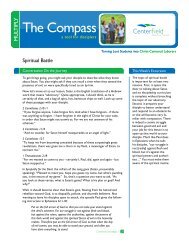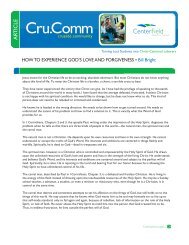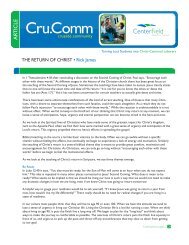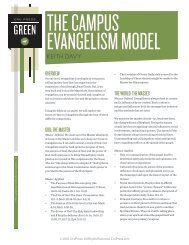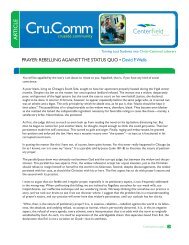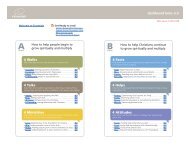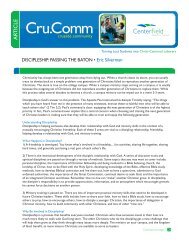Right Reasons for Discipleship - Cru Press Green
Right Reasons for Discipleship - Cru Press Green
Right Reasons for Discipleship - Cru Press Green
Create successful ePaper yourself
Turn your PDF publications into a flip-book with our unique Google optimized e-Paper software.
ARTICLE<br />
The Compass<br />
a tool <strong>for</strong> disciplers<br />
The <strong>Right</strong> <strong>Reasons</strong> <strong>for</strong> <strong>Discipleship</strong><br />
Two years after graduating from Penn State, Roger Hershey visited his alma mater and dropped in on the weekly<br />
<strong>Cru</strong> meeting. There he made an unexpected acquaintance. After the meeting, Roger was approached by a student<br />
named Doug, who introduced himself and began to share his personal story of how he had come to Christ. As his<br />
story unfolded, Doug mentioned that he had been led to Christ and been discipled by a guy named Lee.<br />
“Lee. You mean Lee Carerra in the Theta Chi House?” Roger asked.<br />
Roger recalled that Lee Carerra had come to Christ through a man named Jack, who was also in the Theta Chi<br />
House. He then remembered that Jack had come to Christ when Roger and a friend named Zeke sat down with<br />
Jack and led him to the Lord. As Roger stood talking with Doug, who had been led to Christ and discipled by Lee,<br />
who had been discipled by Jack, who had once been discipled by Zeke (a man Roger himself had discipled), Roger<br />
realized he was now standing be<strong>for</strong>e his own spiritual great-great-grandson. And in that moment, all the activities<br />
Roger could count as accomplishments throughout his college career – marching band, cheerleading, fraternity<br />
brother, just to name a few – paled in comparison to the reward of witnessing a life like Doug’s trans<strong>for</strong>med by the<br />
Gospel – a trans<strong>for</strong>mation that resulted from a series of relationships, originating with Roger himself.<br />
It’s been thirty years since that encounter, and Roger Hershey says, “I always point back to the fact that I had the<br />
privilege of investing my life in young men who now, years later, invested their lives in men… and down the road<br />
there will be hundreds of people’s lives who have changed because of the privilege of discipleship I had in college.”<br />
This is why <strong>Cru</strong> exists. <strong>Cru</strong> is not a movement of fellowship and worship. <strong>Cru</strong> is not a movement of small groups<br />
and parties. We like to worship, fellowship, have parties, etc. But <strong>Cru</strong> is about evangelism and discipleship. Here are<br />
three reasons why.<br />
Because it’s Biblical<br />
In Matthew 28:18-20, we are commanded to make disciples. Jesus said “go into the world and make disciples”. He<br />
didn’t say “go into the world and make fellowship groups,” “go into the world and have parties,” or “go into the<br />
world and make campus Christian clubs.” He said “go into the world and make disciples’. That is the Great Commission.<br />
That’s why we’re serious about it. It’s what Jesus told us to do.<br />
Because Jesus Did It<br />
Study the Gospels and you will see that while Christ ministered <strong>for</strong> three years to masses of people, He primarily<br />
spent his time with twelve men into whom He poured His whole life. He took them everywhere with Him, taught<br />
them, trained them, and invested His life into them. They caught the life of Christ by spending time with Him.<br />
Jesus ushered in a spiritual kingdom that has lasted more than two thousand years because he invested his life in<br />
twelve men. Robert Coleman’s book The Master Plan of Evangelism is a study of the life of Christ and how He took<br />
those twelve men and discipled them. If we are going to give our lives to others, Jesus’ strategy is probably the best<br />
strategy.<br />
There are a lot of ways that people grow and are developed, both in church and on campus. On campus, we have<br />
weekly <strong>Cru</strong> meetings, retreats, Bible studies, parties, worship times, and fellowship. We create an environment<br />
where people can engage in our vision and grow through large-group teaching and fellowship. But the heart of<br />
Continued on page 2
ARTICLE The RiGhT ReAsons FoR DisciPleshiP<br />
2<br />
discipleship exists within small groups of believers who are building into each other’s lives at a deeper level – being<br />
held accountable to someone who is moving more deeply into their lives to help them work out what they’re<br />
learning. As James says, we want people not only to be hearers of the Word, but doers of the Word. Doing of the<br />
Word most often works itself out in the context of discipleship relationships.<br />
The Growth Model<br />
Grace + Truth + Time = Change or Growth<br />
A relationship of grace is marked by a discipler who listens and seeks to understand the person. They communicate.<br />
They believe in the person. They encourage. They walk through life with the person – not only in victory, but<br />
also in failure and sin.<br />
A relationship of truth is marked by infusing the word of God into our life – understanding it, learning how to apply<br />
it, being held accountable to live it out.<br />
<strong>Discipleship</strong> relationships must be marked by Grace + Truth. Not one or the other. <strong>Discipleship</strong> is working out the<br />
truthful word of God in the context of a gracious relationship. Without someone relationally involved in their lives<br />
- loving them, extending grace to them, working through the hard stuff – believers may miss out on the abundant<br />
life Christ promises us.<br />
Because the Benefits Are Far-Reaching<br />
The third reason we disciple is because of the far-reaching benefits of discipleship to our local movement, local<br />
church, and the body of believers around the world.<br />
Benefit #1 – Healthy Community<br />
<strong>Discipleship</strong> develops authentic relationships which can only emerge when we’re diving into one another’s<br />
lives. There is a depth within small groups and one-on-one relationships that cannot happen at a <strong>Cru</strong> meeting<br />
attended by 200 people. Depth is what discipleship is all about.<br />
Benefit #2 – Movement Growth<br />
A movement has long-term growth only as leadership is developed and reproduced. For example, if we start<br />
out with twenty leaders in the fall semester, and each of those twenty leaders disciples one person, we will<br />
have <strong>for</strong>ty leaders the following year. If each of those original twenty disciples develops two more leaders,<br />
we will have sixty leaders. Consider that Jesus started with twelve. The Gospels then talk of Jesus going<br />
from the twelve to the seventy. In the book of Acts, 120 were in the upper room praying with him. He went<br />
from 12 to 70 to 120. During Pentecost, Peter preached the Gospel <strong>for</strong> the first time, and 3,000 people<br />
believed. Movement growth enables us to minister to more people. It means everyone on campus will have<br />
the opportunity to hear about Jesus and to grow more deeply in the knowledge of Him. Those kingdombuilding<br />
ef<strong>for</strong>ts will then in turn raise up more leaders.<br />
Benefit #3 – Movement Longevity<br />
Two thousand years after Jesus poured His life into the original twelve disciples, millions of people all over<br />
the world have been changed by the Gospel message. For us, movement longevity means that in twenty<br />
years, this campus will have a thriving, flourishing body of believers because of the investment made by our<br />
current leaders.<br />
When we talk about discipleship, what is it we hope to produce? What does a mature biblical disciple look like?<br />
Biblical disciples walk by faith.<br />
They are developing their relationships with God by digging into the Scriptures and developing a prayer life.<br />
They start having consistent quiet times. Biblical disciples deal with issues of holiness in their lives. They’re<br />
dealing with sin, and developing a sensitivity to turn from sin when they see it in their lives. They are learning<br />
how to worship, and how to endure trials. They’re developing a walk with the Lord.<br />
Continued on page 3
ARTICLE The RiGhT ReAsons FoR DisciPleshiP<br />
3<br />
Biblical disciples communicate their faith.<br />
Biblical disciples are developing a heart <strong>for</strong> what is on God’s heart, and one of the things on God’s heart is<br />
people who don’t know Him. Biblical disciples have a heart <strong>for</strong> the lost, a growing compassion <strong>for</strong> the fact<br />
that people who don’t know Jesus, need to know Jesus. Biblical disciples want to know how to relate to<br />
non-Christians and how to share a personal testimony in a way that non-Christians can understand. They<br />
want to initiate spiritual conversations in a loving, tactful way, and learn how to answer the tough questions<br />
posed during those encounters.<br />
Biblical disciples multiply their faith.<br />
They can take the things that God has taught them and pass them on to someone else. For instance, if they<br />
lead someone to Christ, do they know what to do besides invite them to <strong>Cru</strong> or take them to church?<br />
Biblical disciples can learn how to study the Word of God in depth, how to dig in, observe, and apply the<br />
Scriptures, so they themselves can ground a new believer in the faith by walking through Scripture with<br />
them. They can also learn how to follow-up with a new believer, lead a Bible study, and act as an accountability<br />
partner.<br />
As you’re meeting with a biblical disciple, ask yourself: “Where is this person?”<br />
• Do we need to focus on walking by faith? Are they spending time in the Word?<br />
• is this person already growing? Are they learning and doing the Word of God? Are they motivated to learn<br />
how to reach out to people around them who don’t know Christ?<br />
• is this person developed in many of these areas and eager to pass on the knowledge God has entrusted to<br />
them?<br />
The compass is the discipleship curriculum <strong>for</strong> campus crusade <strong>for</strong> christ’s campus Ministry. it was created by centerfield Productions,<br />
the field based division of cru<strong>Press</strong>. We’d love to hear your feedback on this lesson. Please write us at centerfield@uscm.org<br />
©2007 <strong>Cru</strong> <strong>Press</strong>, Campus <strong>Cru</strong>sade <strong>for</strong> Christ, Inc. All rights reserved.<br />
No part of this publication may be digitally reproduced, stored in a retrieval system, or transmitted, without the prior permission of <strong>Cru</strong> <strong>Press</strong>.<br />
End



